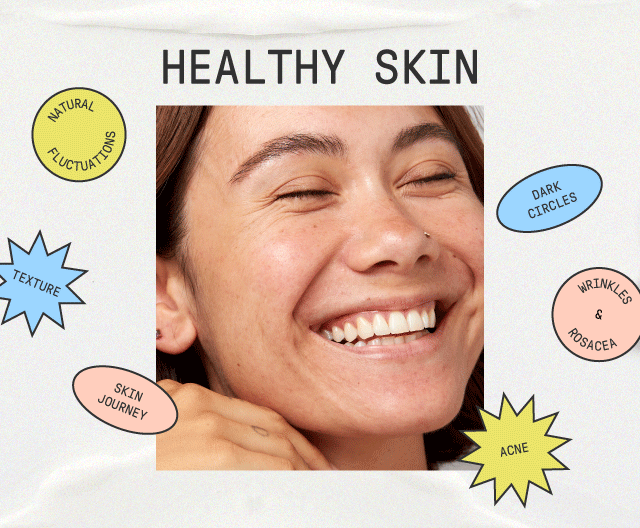Deep Dives
What is Healthy Skin?


SHARE
Deep Dives
What is Healthy Skin?
Medically reviewed by Aimee Paik, MD
Written by Annie Lam
Last updated 8/2/2021
Let’s talk about “healthy skin”. Here at Apostrophe, our goal is for everyone to feel confident in their skin. And part of achieving that goal is normalizing the fact that healthy skin isn’t “flawless” skin. We’re defining what “healthy skin” really is, and how it looks different for everyone!
Defining Healthy Skin
Technically speaking, our medical director Dr. Aimee Paik says, “Health is sometimes defined as the absence of disease. Acne and rashes are a form of inflammation that can be painful or itchy and will affect the skin’s appearance. Your skin will naturally age over time and can still be healthy and beautiful, but excessive sun exposure or smoking will rapidly accelerate the pace of skin aging and furthermore can cause skin cancer. I believe respecting your skin and taking care of it results in healthy skin.”
Just like how healthy bodies come in all different shapes and sizes, healthy skin also looks different for everyone. Many people have their own definition of healthy skin, but we want to clarify that healthy skin does not equal flawless skin. Real skin has pores, texture, dark circles, and more.
How skin health affects mental health
Having skin conditions like acne and rosacea can be very emotional, vulnerable, and take a toll on your mental health. Based on this 2018 study, "Patients with acne have a 63% increased risk of developing depression compared to patients who did not have acne.” We know that skin conditions like acne and rosacea can be painful and negatively impact your mental health. It doesn't just affect your vanity, it's deeper than that.
Dr. Paik says, “Skin conditions can absolutely be a source of distress and have a real impact on people’s lives. It’s not uncommon for patients to tell me that they don’t want to hang out with their friends or do the activities they used to enjoy because they��’re embarrassed by their acne. Skin disorders can lead to lower self-esteem and depression and/or anxiety.”
Do beauty standards have an impact?
We’ve grown up with beauty standards saying that “beautiful people” are slender, clear-skinned, and have long legs. It’s easy to compare yourself to these standards and feel less about yourself because you don’t fit into this mold that society has created.
According to Dr. Paik, “there is a distorted view of what skin should be like in part due to false societal beauty standards. I find myself constantly explaining to patients that real skin is not like what you see in airbrushed photos. False societal beauty standards disconnect people from reality and can lead to intense dissatisfaction with one’s natural skin.”
How does social media tie into skin health and mental health?
Social media can also play a big role in defining societal beauty standards. Beauty filters on TikTok and Instagram can create false expectations of what we think we should look like. It’s easy to compare ourselves to influencers and others on social media.
“I think social media has a real impact on mental health,” Dr. Paik notes. “Just like social media posts represent a tiny little sliver of someone’s real life, skin imperfections can easily be masked by make-up, filters, or airbrushing. Surrounding yourself with distorted images of real skin (and life) can be very disheartening to those with acne or other skin disorders.” Filters create the illusion of flawless skin and hide “real skin” in the process.
Our Stance
At Apostrophe, we want to normalize real skin - pores, skin texture, hyperpigmentation, and acne are all normal! Healthy skin is not poreless or creaseless. Your skin is your body’s largest organ, and it plays a big role in keeping your body healthy. Dr. Paik says, “Your skin is a living dynamic organ with incredibly important functions. Pores are a natural and important part of normal skin.“ We think it’s important to celebrate all that your skin does for you, and part of that is loving it regardless of what stage it’s in.
We also don’t believe in “before and after” photos because your skin is on an ongoing journey that isn’t always linear. As you might have seen on our website or social media, we love sharing your skin’s progress by saying “before and now.” At Apostrophe, we do not photoshop or retouch models’ skin, and we hope this becomes a standard in the industry.
Unedited photos, non-retouched skin, and unfiltered selfies should be the norm. We believe it’s important to normalize real skin, acne, and your natural features. We love helping you feel confident in your own skin, and redefining beauty standards can help!
We want to see and celebrate your real skin! Tag us @hi_apostrophe on Instagram and TikTok sharing your stories with #RealSkinIsIn. We know skincare can be emotional, vulnerable, and can greatly affect your mental health. We want this to be a safe space for our community - let’s move towards normalizing real skin!
Like what you just read? Sign up for our email list to get the scoop on skincare science delivered straight to your inbox.

Deep Dives
A dermatologist shares his thoughts on the recent studies about benzoyl peroxide and benzene.
Read More
Education
What is milia?
What is milia? Today, we’re jumping into one type of bump that you may have heard about most commonly in infants — milia.
Read More
Education
Best moisturizer for acne-prone skin
If you have combination acne-prone skin, figuring out which moisturizer is best for your skin might be tough. In this guide, we break down the best moisturizer for combination, acne-prone skin.
Read More